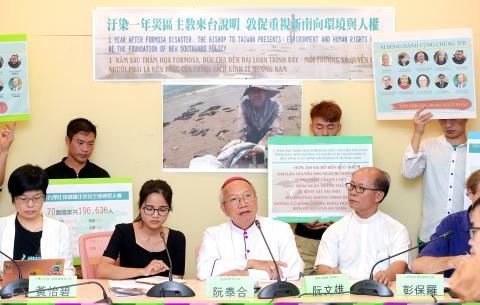Human rights and environmental considerations should be incorporated into the government’s New Southbound Policy, a group of Taiwanese and Vietnamese campaigners said yesterday, proposing measures to remedy the problems revealed by a major environmental scandal.
“The New Southbound Policy only focuses on Taiwan’s development — not the development of Southeast Asia as a whole — and it does not place any emphasis on environmental protection and societal growth. The policy needs to include these kinds of issues to make sure that investors are accountable,” Vietnamese Catholic Bishop Nguyen Thai Hop said.
Nguyen’s Vinh diocese encompasses a swathe of the seacoast affected by a mass fish die-off last year that was linked to pollution caused by a steel plant owned by a Vietnamese subsidiary of Formosa Plastics Group.

Photo: Chang Chia-ming, Taipei Times
He made the remarks at a news conference attended by Vietnamese migrant workers, after presenting a petition to the Presidential Office, saying that stricter overseas investment regulations could have prevented the disaster and would enable the nation to differentiate itself from China.
“This would help prevent Taiwanese firms from being targeted during anti-China riots,” he said, referring to riots in 2014 when more than 100 Taiwanese factories were attacked by people protesting against Chinese activities in the South China Sea.
Safeguards do not need to be overly strict, as long as they are reasonable, fair and just, he said.
Environmental Jurists Association secretary-general Lin Jen-hui (林仁惠) called for amendments to the Statute for Industrial Innovation (產業創新條例) to grant the Ministry of Economic Affairs the authority to bar Taiwanese overseas investment projects that could violate the rights of workers and people in the host nation.
Companies should be required to submit human rights impact assessment reports along with their applications and the government should have the power to revoke investment permits of companies that are found to have reneged on their pledges, Lin said.
PENALTY
“Any company that violates their promises should face a fine, unlike the current situation where the government’s hands are tied,” she said.
Covenants Watch chief executive officer Huang Yi-bee (黃怡碧) said that citizens of foreign states should be allowed to seek redress and compensation in Taiwanese courts for human rights violations committed by Taiwanese firms abroad.
Nguyen called on the government to put pressure on Formosa Plastics to increase the compensation offered to people affected by the mass fish die-off and require the Vietnamese government to clarify how the money would be distributed, such as publicizing the amount of compensation provided to each person.
“The US$500 million compensation, to which the Vietnamese government agreed, was not approved by the public and did not go through a court — it is a meager amount, given the number of people affected,” he said, adding that the Catholic Church is in the process of aggregating victims’ claims to estimate the amount of compensation required.
Huang said that the church has become a conduit for the victims to express their opposition to the Vietnamese government’s handling of compensation, because many of them are Catholics and the government is unwilling to crack down on the church.

Beijing could eventually see a full amphibious invasion of Taiwan as the only "prudent" way to bring about unification, the US Department of Defense said in a newly released annual report to Congress. The Pentagon's "Annual Report to Congress: Military and Security Developments Involving the People's Republic of China 2025," was in many ways similar to last year’s report but reorganized the analysis of the options China has to take over Taiwan. Generally, according to the report, Chinese leaders view the People's Liberation Army's (PLA) capabilities for a Taiwan campaign as improving, but they remain uncertain about its readiness to successfully seize

Taiwan is getting a day off on Christmas for the first time in 25 years. The change comes after opposition parties passed a law earlier this year to add or restore five public holidays, including Constitution Day, which falls on today, Dec. 25. The day marks the 1947 adoption of the constitution of the Republic of China, as the government in Taipei is formally known. Back then the Chinese Nationalist Party (KMT) governed China from Nanjing. When the KMT, now an opposition party in Taiwan, passed the legislation on holidays, it said that they would help “commemorate the history of national development.” That

Taiwan has overtaken South Korea this year in per capita income for the first time in 23 years, IMF data showed. Per capita income is a nation’s GDP divided by the total population, used to compare average wealth levels across countries. Taiwan also beat Japan this year on per capita income, after surpassing it for the first time last year, US magazine Newsweek reported yesterday. Across Asia, Taiwan ranked fourth for per capita income at US$37,827 this year due to sustained economic growth, the report said. In the top three spots were Singapore, Macau and Hong Kong, it said. South

Snow fell on Yushan (Jade Mountain, 玉山) yesterday morning as a continental cold air mass sent temperatures below freezing on Taiwan’s tallest peak, the Central Weather Administration (CWA) said. Snowflakes were seen on Yushan’s north peak from 6:28am to 6:38am, but they did not fully cover the ground and no accumulation was recorded, the CWA said. As of 7:42am, the lowest temperature recorded across Taiwan was minus-5.5°C at Yushan’s Fengkou observatory and minus-4.7°C at the Yushan observatory, CWA data showed. On Hehuanshan (合歡山) in Nantou County, a low of 1.3°C was recorded at 6:39pm, when ice pellets fell at Songsyue Lodge (松雪樓), a